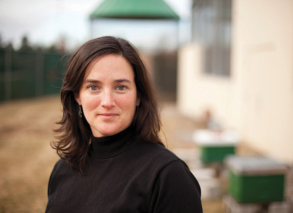
DEGREES/TRAINING: B.S. in biology; Ph.D. in philosophy in zoology, ecology, and evolutionary biology, Michigan State University; postdoctoral research fellow, University of Illinois at Urbana-Champaign and Smithsonian Tropical Research Institute, Panama
JOB TITLE: Associate professor of biology and animal behavior at Bucknell University
FAVORITE TRINITY MEMORY: It’s hard to pick a favorite, but most memories involve people who are still good friends. From our first year in High Rise (seniors living adjacent to first-years — who decided on that arrangement?) to later living along the quad above the arch near Cinestudio. Back in those days, we played ultimate Frisbee on the quad near the Chapel. Do people still swing on the flagpole?
What made you want to work in higher education?
My experiences at Trinity were instrumental in my choice to be a scientist at a liberal arts institution. Trinity is where I fell in love with ideas and the pursuit of science. I also come from a family of educators/teachers, which made the worlds of education and biology a natural fit for me.
What do you enjoy most about your work?
I appreciate that my job involves the “life of the mind.” I like that I can combine doing research science with a creative endeavor. At Trinity, I wrestled with my interest in being either a theater major or a biology major, which seemed like polar opposite disciplines at the time. Now, however, I see that the arts and the sciences are alike in many components; they both take a set of rules or procedures and create something new — an experience (like a performance) or new knowledge (like a scientific conclusion). Both sets of classes/experiences helped shape who I am today. I enjoy being able to teach college students about biology, animal behavior, and neuroscience in small courses.
What is the focus of your research?
I study insect behavior, most specifically the behaviors of insects like honeybees. My research revolves around trying to figure out how these small, short-lived animals take in information from the environment and use that information flexibly. Most people don’t know that bees have to learn about the world; they need to learn the location of their nest, the timing and availability of food, what their colony smells like, and how the sun appears to move across the sky each day. They can learn color, shape, pattern, texture, and odors and associate them with other cues. I’m interested in how they orient and navigate in the landscape as they start to search for food. My research is quite basic. Because I study animals that are important to agriculture, gardeners, and hobby beekeepers, it comes with a fan club of sorts!
Was there a professor at Trinity who was particularly influential?
Dr. Craig W. Schneider was an influential professor and came to be a good friend. I found his teaching style incredibly engaging and his passion for his research to be motivational. I was lucky enough to have been able to get to know his family, and we have maintained a relationship since way back then. Michael O’Donnell in biology was also an inspiration as a teacher. They definitely had a huge impact on my growth as an educator.
What was the most memorable course you took at Trinity?
I don’t know if I can pick a single course … many stand out in my memory! Lots in biology, perhaps obviously. I remember fun field trips to quaking bogs and other neat habitats around Hartford. A very salient memory is of Dr. Daniel Blackburn singing “We’ve Come a Long Way from Amphioxus” in vertebrate anatomy class; I recall enjoying African American history with Cheryl Greenberg, plus multiple courses in theater and music.